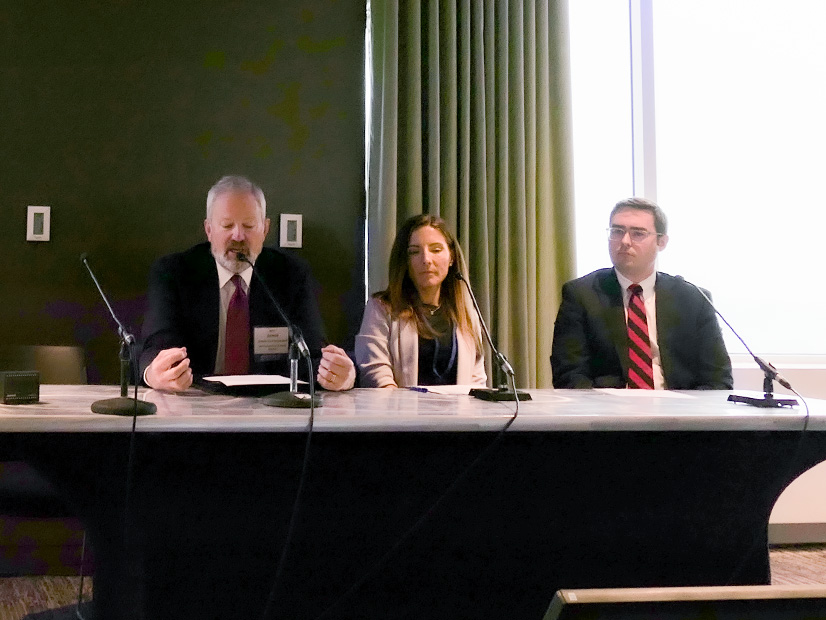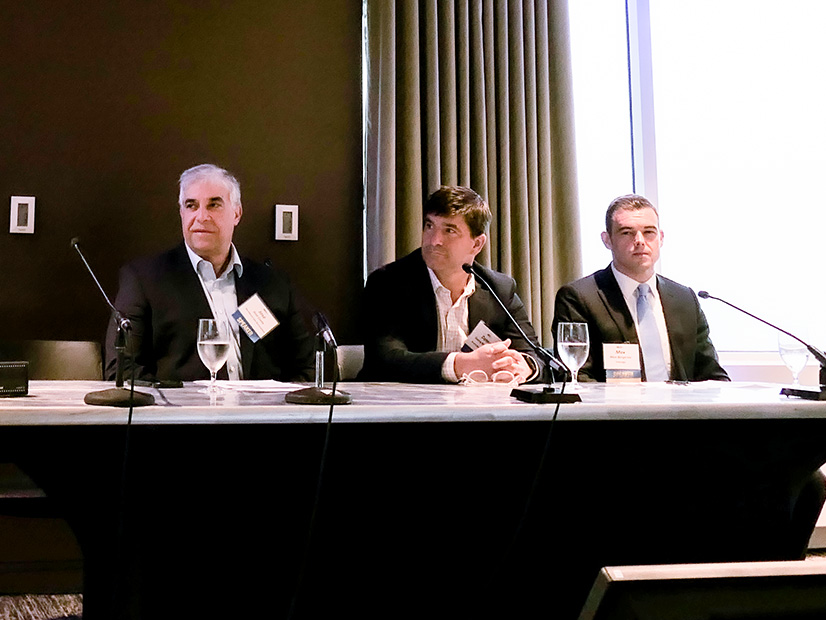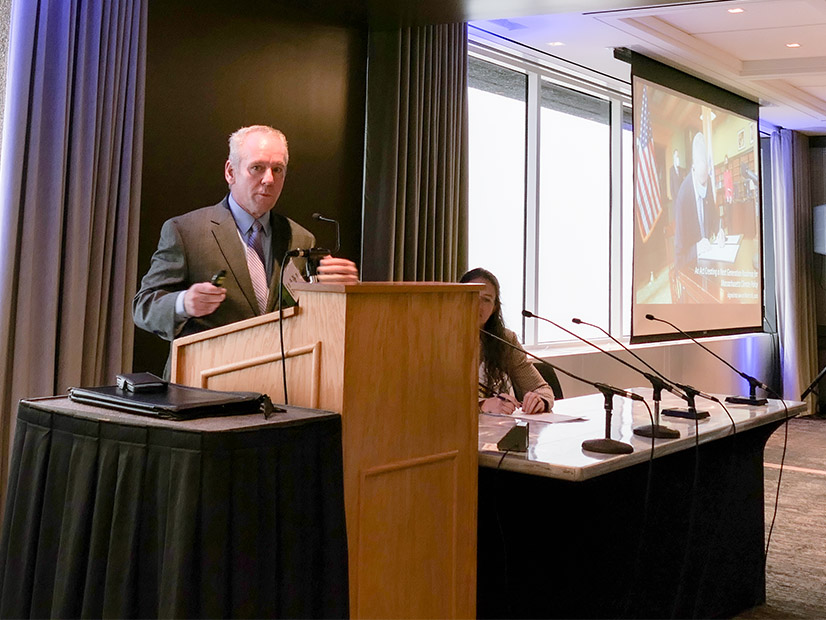
New England regulators, policymakers and industry representatives convened in downtown Boston last week to discuss the potential of alternative fuels in the region’s push for decarbonization.
The conference was organized by the Northeast Energy and Commerce Association and featured talks and panels about the future of the natural gas network, along with the potential of fuels like hydrogen, renewable natural gas (RNG), biodiesel and renewable diesel in the energy transition.
The uncertain future of the region’s gas network loomed large over the course of the conference. Massachusetts, New York and Rhode Island all have ongoing state investigations into the future of their natural gas systems, with options ranging from widescale decommissioning to doubling down on the infrastructure.
“It’s so important to consider all options — that includes using the pipes which are in the ground, and potentially expanding pipes — to be able to meet the energy needs of the future,” said Max Bergeron of Enbridge.
The company recently announced an open season for a project that would increase its pipeline capacity of natural gas to the northeast. (See Enbridge Announces Project to Increase Northeast Pipeline Capacity.)
“We anticipate we will see a growth in demand for gas utilities of about 6½% over the next five years,” Bergeron said. “We also have to keep in mind that the power grid is very much reliant here in New England on natural gas-fired generation, so we see a strong need for incremental pipeline capacity to alleviate some of those bottlenecks.”
Carleton Simpson, a commissioner on the New Hampshire Public Utilities Commission, said fuel availability “appears to represent a significant challenge moving forward” and added that a “NERC-style entity” may be needed to ensure the reliability of the gas network.
Jessica Waldorf, chief of staff and director of policy implementation at the New York Department of Public Service, said the state faces a tough task of maintaining the functionality of the gas network while keeping up with decarbonization.
“There’s certainly a lot of pressure for us to move quickly away from use of natural gas,” Waldorf said, while noting the state’s gas utilities simultaneously connect “tens of thousands of new customers to the natural gas system.”
Waldorf said if utilities continue to add customers at current levels, the state will be required to ensure the system can “safely and reliably meet the demand of those customers.” She added this will result in “really hard infrastructure decisions.”
“It also is increasingly challenging because we’re balancing those decisions against the requirements of the Climate Act, in addition to all of our other statutory responsibilities,” Waldorf said. “And that means additional review processes and additional analysis is needed to really justify the need for these projects on the basis of reliability.”
Jamie Van Nostrand, chair of the Massachusetts Department of Public Utilities (DPU), echoed the concerns about gas availability while questioning whether utilities should continue their pace of new gas hookups.
“To some extent, it seems to be business as usual in the natural gas industry with respect to new residential hookups and continuing levels of load growth,” Van Nostrand said. “Is that consistent with the statutory emissions limits that we need to achieve?”
Van Nostrand called the dynamic “a disconnect,” adding, “things seem to be that bad that [the gas utilities] are worried about the need to keep the Everett Marine Terminal open to address reliability concerns, but it doesn’t seem to have any impact on policies with respect to accommodating new connections.”
The DPU chair also called for a greater focus on reducing the energy burden on residents as the state transitions away from fossil fuels.
“We want to start a proceeding to focus on the energy burden, to figure out if there are rate designs … that would allow us to move rapidly forward on a clean energy agenda, while still recognizing that people have a hard time paying their bills,” Van Nostrand said. “That’s a very high priority for this commission.”
Hydrogen And RNG
State policy concerning the future of the gas networks frequently has pitted climate organizations against the gas industry, with climate groups pushing to rapidly decommission gas networks and the industry advocating for a continued reliance on the gas system and the blending of alternative fuels like RNG and hydrogen.
Bergeron said RNG and hydrogen could be blended into the gas network to lower its carbon intensity, while acknowledging fossil fuels like natural gas will have an “ongoing role.”
“We see RNG as an opportunity to leverage our existing network,” Bergeron said.
Jose Costa of the Northeast Gas Association echoed Bergeron’s support for fuel blending and added that legislative and regulatory help is needed to bring RNG into the region’s gas network.
“Electrification of everything is not the sole answer,” Costa said. “The natural gas distribution network, it’s going to be there, it’s going be needed, and I’m not sure if fully renewable energy will be the energy source of the future — it’s going to be a mixture.”
Massachusetts Rep. Jeff Roy, (D) co-chair of the Legislature’s Joint Committee on Telecommunications, Utilities and Energy, told the conference Massachusetts “must use all the tools at its disposal to remain both a national leader in climate mitigation efforts and a prosperous, affordable home to residents.”
Roy highlighted a bill he introduced this legislative session (H.2938) that would promote the use of alternative fuels including RNG and hydrogen in the state’s gas network, calling the bill “a starting point for our conversation on the role of fuels in the Commonwealth’s future.”
Lobbyists for gas industry groups including Enbridge, National Grid and the Propane Gas Association of New England have supported Roy’s bill, arguing it would make efficient use of the existing gas network.
Meanwhile, members of climate organizations including the Green Energy Consumers Alliance, Mothers Out Front and Gas Transition Allies have opposed the bill, arguing that using the fuels in the gas network simply would perpetuate fossil fuel reliance and would lead to high costs to ratepayers due to the mounting expenses of maintaining the state’s aging gas network, combined with the high costs of hydrogen and RNG.
“The Commonwealth’s clean energy and climate plans indicate that the best pathway to clean heat is through electrification, not renewable natural gas and hydrogen, which this bill subsidizes,” Carrie Katan of the Green Energy Consumers Alliance told a legislative committee in June, adding the fuels are better suited for hard-to-decarbonize sectors like air travel.
Katan said biofuels like RNG are “fundamentally inefficient fuel sources” constrained by the feedstocks used to produce them, adding “no amount of state subsidies will overcome these problems for RNG, just as no amount of federal support could make ethanol the future of transportation.”
The environmental groups also argued that blending in alternative fuels would perpetuate the health effects and safety issues from the natural gas network. A 2022 study from Boston College’s Global Observatory on Planetary Health found that air pollution contributed to nearly 3,000 excess deaths in Massachusetts in 2019, largely attributed to burning fossil fuels.
Boston College biology professor Philip Landrigan, a co-author of the study, told NetZero Insider that blending hydrogen or RNG into the natural gas supply would have little effect on the local air pollution associated with the gas system, including the release of air pollutants like NOx gases, benzene, and other toxic chemicals.
Landrigan added that while the local air pollution impacts of natural gas are not as bad as coal or oil, natural gas is “every bit as powerful a greenhouse gas.” The professor added that he considers the effort to mix hydrogen into the gas network to be “a desperate attempt by the fossil fuel industry” to maintain a market for gas and protect their investments in gas infrastructure.





